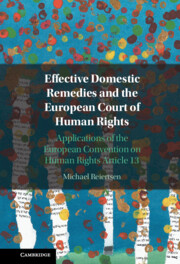 Effective Domestic Remedies and the European Court of Human Rights
Effective Domestic Remedies and the European Court of Human Rights Published online by Cambridge University Press: 11 August 2022
Chapter 9 analyzes three requirements and principles that are overarching to access to justice and redress. First, the remedy must provide the applicant with a personal right. This implies that it does not suffice that the national authority has supervisory or discretionary power to look at the case and provide redress and that it cannot be left solely in the hands of the State to set the remedy in motion. Second, how an aggregate of remedies may satisfy Article 13. This principle has been criticized. However, as the chapter illustrates, an aggregate of remedies may, also, enhance the effectiveness of the remedial task. Further, the chapter demonstrates how the Court, currently, applies the requirement in a stricter manner. Third, how the remedy must be effective not only in theory but also in practice. Also this requirement has, in recent years, been applied in a stricter manner by the Court. But it remains uncertain whether the remedy needs to be generally ineffective, for example, because of systemic problems, or to what extent more isolated acts or omissions, also, may render the remedy ineffective in practice.
To save this book to your Kindle, first ensure [email protected] is added to your Approved Personal Document E-mail List under your Personal Document Settings on the Manage Your Content and Devices page of your Amazon account. Then enter the ‘name’ part of your Kindle email address below. Find out more about saving to your Kindle.
Note you can select to save to either the @free.kindle.com or @kindle.com variations. ‘@free.kindle.com’ emails are free but can only be saved to your device when it is connected to wi-fi. ‘@kindle.com’ emails can be delivered even when you are not connected to wi-fi, but note that service fees apply.
Find out more about the Kindle Personal Document Service.
To save content items to your account, please confirm that you agree to abide by our usage policies. If this is the first time you use this feature, you will be asked to authorise Cambridge Core to connect with your account. Find out more about saving content to Dropbox.
To save content items to your account, please confirm that you agree to abide by our usage policies. If this is the first time you use this feature, you will be asked to authorise Cambridge Core to connect with your account. Find out more about saving content to Google Drive.